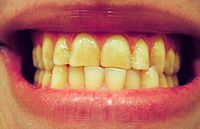
Photo from wikipedia
BACKGROUND Sleeping problems are common in the pediatric population. Their potential relationship with oral manifestations is in the scope of researchers' interest. OBJECTIVES The aim of the present study was… Click to show full abstract
BACKGROUND Sleeping problems are common in the pediatric population. Their potential relationship with oral manifestations is in the scope of researchers' interest. OBJECTIVES The aim of the present study was to evaluate the possible associations between sleeping habits and sleep bruxism, temporomandibular disorders (TMD) and dental caries among children by using Children's Sleep Habits Questionnaire (CSHQ). MATERIAL AND METHODS A cross-sectional study was carried out at the Faculty of Dentistry of Istanbul Aydin University, Turkey, with a representative sample of 100 children aged 6-13 years. The CSHQ was completed by their parents. In addition, an intraoral examination was carried out in a clinical setting and sleep bruxism was recorded. The temporomandibular joints (TMJ) were examined and TMD were rated according to the Helkimo anamnestic and clinical dysfunction index. Data was analyzed with Fisher's exact test and the χ2 test. RESULTS Among sleeping habits, bedtime resistance was found to be significantly associated with sleep bruxism and TMD symptoms in children. Sleep behavior problems were also found to be related to TMD. Untreated dental caries was significantly associated with sleep fragmentation. CONCLUSIONS Sleep bruxism, TMD and untreated dental caries might have a negative impact on children's sleeping habits and characteristics. Pediatricians and pedodontists should collaborate to identify the causes and clinical features of sleeping habits and disorders in order to avoid adverse effects on the child's stomatognathic system.
Journal Title: Dental and medical problems
Year Published: 2022
Link to full text (if available)
Share on Social Media: Sign Up to like & get
recommendations!